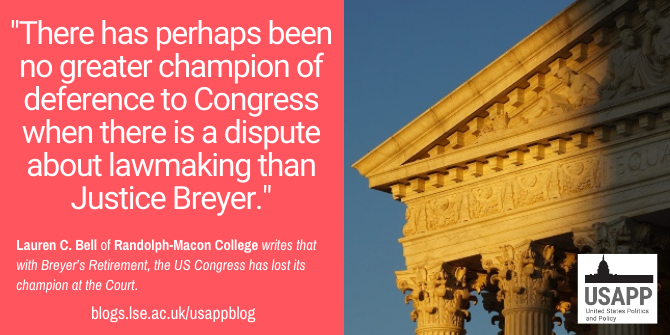 Last week, Associate Justice Stephen Breyer announced that he would be retiring from the US Supreme Court after nearly 30 years. Lauren C. Bell writes that while Breyer’s departure is not likely to change the Court’s 6-3 conservative-liberal split, it does mean the Court will be losing its member who is most committed to respecting and deferring to the will of Congress.
Last week, Associate Justice Stephen Breyer announced that he would be retiring from the US Supreme Court after nearly 30 years. Lauren C. Bell writes that while Breyer’s departure is not likely to change the Court’s 6-3 conservative-liberal split, it does mean the Court will be losing its member who is most committed to respecting and deferring to the will of Congress.
Since March 2021, the Twitter account @retirebreyer has been tweeting near daily updates on United States Supreme Court Associate Justice Stephen Breyer’s employment status. The account was part of an active campaign by progressive groups to pressure Breyer to step down from the Court while political conditions are right – i.e., a Democratic White House and US Senate – for a like-minded replacement to be confirmed. On Wednesday, January 26, after approximately 300 days of reporting that Breyer had not indicated he would retire the account tweeted: “Stephen Breyer announced his retirement today.”
The Announcement’s Aftermath
Regardless of the unusual campaign to persuade him to retire, at 83, and after 27 years on the nation’s highest Court, Breyer’s departure should not come as a tremendous surprise. The US Constitution allows justices to serve what are effectively lifetime terms, but—the deaths while serving of Justices Antonin Scalia and Ruth Bader Ginsburg notwithstanding—retirement, not death remains the most common method of departing the Court. Nor are there quite as many questions swirling about who is likely to succeed Breyer. President Joe Biden has made clear that he will appoint the first Black woman to the nation’s highest court.
With few women of color serving as federal judges and state supreme courts also woefully underrepresentative of the diversity in American society, speculation about who will be nominated has focused quickly on several highly-qualified contenders: federal judges Ketenji Brown Jackson and J. Michelle Childs, and California Supreme Court justice Leondra Kruger. Other possible, but less likely, candidates include New Jersey State Supreme Court justice Fabiana Pierre-Louis, whose youth—she’s just 41—extensive work as a federal prosecutor, and experience shattering the New Jersey Supreme Court’s glass ceiling will likely earn her at least a look.
Fewer questions than usual about the short list of potential nominees has led media outlets to turn their attention to publishing predictions about how President Biden’s as-yet unnamed choice to replace Breyer will affect the Court. Spoiler alert: Breyer’s replacement, no matter how far left-leaning, won’t be able to affect the Court’s current 6-3 conservative-to-liberal ratio. But the presence of a new justice whose life experiences differ from those already on the bench is certain to broaden the range of issues the justices consider as they think about the cases they hear.
Breyer’s announcement also prompted court-watchers to offer retrospectives on Breyer’s career. Nearly all of these have eulogized his judicial service as reflecting a pragmatic and consensus-building style. No account, however, has focused on what might be perhaps Breyer’s most surprising and enduring judicial trait: his abiding respect for, and confidence in, the institutions of government, especially the United States Congress.
A Champion for Congress
There has perhaps been no greater champion of deference to Congress when there is a dispute about lawmaking than Justice Breyer. As his friend and former colleague on the US Senate Committee on the Judiciary Kenneth R. Feinberg noted in a 2008 tribute: “I venture to say that nobody on the Supreme Court today is more deferential to the Congress and to congressional enactments than Justice Breyer.”
Although his votes in cases before the Court in areas such as abortion rights, gun control, the Affordable Care Act, and civil rights placed him firmly in the liberal voting bloc, a close reading of many of Breyer’s written opinions reveals that no matter how he voted in a case, his decision-making was driven in large part by his belief in the primacy of elected legislatures. Indeed, in 2007, Justice Breyer told a group of visiting judges from the European Court of Justice that when the Court must determine whether an act of Congress is constitutional, “I will think ‘we’re not elected here, and [members of Congress] are.’ And I do think about that in a close case. There’s a democratic expertise factor in a very close case.”

Photo by Ian Hutchinson on Unsplash
Breyer’s support for legislative institutions has consistently been apparent whether he was on the winning or the losing side of a case. His opinion for the Court in NLRB v. Noel Canning (2014) upheld the right of the United States Senate to declare itself in session, even when it was clearly not conducting business and was remaining in pro forma session solely for the purpose of denying President Barack Obama the ability to make recess appointments. Breyer’s dissents in both United States v. Lopez (1995) and United States v. Morrison (2000)—the former coming in the first year of his Supreme Court career—argued that it is Congress that has the authority to determine the relative power held by the states and federal government regarding the Commerce Clause. His dissent in District of Columbia v. Heller (2008) argued that courts should defer to legislatures when it comes to regulating weapons in the interest of their citizens’ health and safety. He said as much again in his dissent in McDonald v. Chicago (2010), in which he wrote that he could not find “any justification for interpreting the Constitution as transferring ultimate regulatory authority over the private uses of firearms from democratically elected legislatures to courts.”
How Breyer’s departure will reshape the Supreme Court
Following on Breyer’s retirement announcement, focus has rightly shifted to thinking about the future of the US Supreme Court. There is near certainty that Breyer’s successor will be a Black woman, who will bring a set of different and much-needed experiences with her to the bench. To be sure, however, regardless of who ultimately replaces him the impact of Breyer’s departure will not likely affect the outcome of very many cases before the Court: with a 6-3 split and an increasingly polarized Court, the outcome of most cases is hardly in question. Still, the loss of his presence behind the scenes has the potential to accelerate what appears to be diminishing collegiality and increasingly acrimonious relations among the justices.
As the trend toward congressional abdication of lawmaking authority accelerates, Breyer’s retirement is consequential for a third reason: he has long been the small-d democratic conscience of the Court. Breyer’s retirement quiets the current Court’s most consistent voice for the democratic will at a time when American democracy feels more tenuous than ever.
Please read our comments policy before commenting.
Note: This article gives the views of the author, and not the position of USAPP – American Politics and Policy, nor the London School of Economics.
Shortened URL for this post: https://bit.ly/3Hl6GCr
About the author
 Lauren C. Bell – Randolph-Macon College
Lauren C. Bell – Randolph-Macon College
Lauren C. Bell is Professor of Political Science and Dean of Academic Affairs at Randolph-Macon College in Ashland, Virginia. She is the author of Filibustering in the US Senate (Cambria Press: 2011) and Warring Factions: Interest Groups, Money, and the New Politics of Senate Confirmation (The Ohio State University Press: 2002), and co-author of Slingshot: The Defeat of Eric Cantor (CQ Press 2015). She served as a United States Supreme Court Fellow during 2006-07, and was an American Political Science Association Congressional Fellow on the US Senate Committee on the Judiciary from November 1997 until August 1998.






